Andrea’s story
Andrea is a 44-year-old and originally from Latin America. Her housing conditions were extremely bad, and they made her feel sick. Though the damp in her house made her asthma worse, better housing was unaffordable to her.
Financial foundations for adult health
Seeing with new eyes
We spoke in-depth to four people to understand how their health and finances interacted. They each detailed their experiences in their financial diary.
Restricted access to community-based services such as money and legal advice, as well as mental health and housing services, makes it even hard to cope with cliff-edge moments. This is certainly the case for Daliya, one of the diarists.
Improving access to financial and debt advice services has the ability not only to improve people’s financial health, but also consequently their physical health.
Daliya’s financial diary shows a 27-year-old mother with multiple long-term health conditions living in South London. Before her children were born, she worked full time, but she later stopped working to care for her children, aged three and six.
As a single mother, Daliya raises her kids alone and receives limited support from her children’s father. She is registered disabled and receiving means-tested benefits as well as disability and sickness benefits. Over the course of 2019 and 2020, however, Daliya experienced cuts and interruption to her benefits, making her unable to pay her bills at times. Unsurprisingly, this put a major stress on her mental health.
Daliya has lived with Nystagmus from birth; this is a vision condition in which the eyes make uncontrolled movements that often result in reduced vision and depth perception. On top of her vision condition, in 2016 she started to become unwell with anxiety, depression and bipolar disorders.
Three years later, in January 2019, she was diagnosed with prediabetes. These conditions severely challenge not only her sight, but also her daily activities.
Despite her daily challenges, Daliya actively looked for a job last Autumn while also trying to graduate from a part-time degree in Computing, IT and Mathematics. She paid for her education with a £3000 student loan. Since she had young children at home, she studied when they were at school or sleeping.
Ferdinand, the father of Daliya’s children, does not live with them, but does try to help the family by picking up their eldest son from school every day, supporting Daliya with showering her upper body, which she struggles to do by herself, and buying groceries.
Even though Ferdinand does the shopping, she pays for the groceries since Ferdinand does not have a stable job. Despite the assistance, Ferdinand’s help is not enough for Daliya. In an honest moment, she told us that money is a huge challenge, and she cannot count on anybody, not even him.
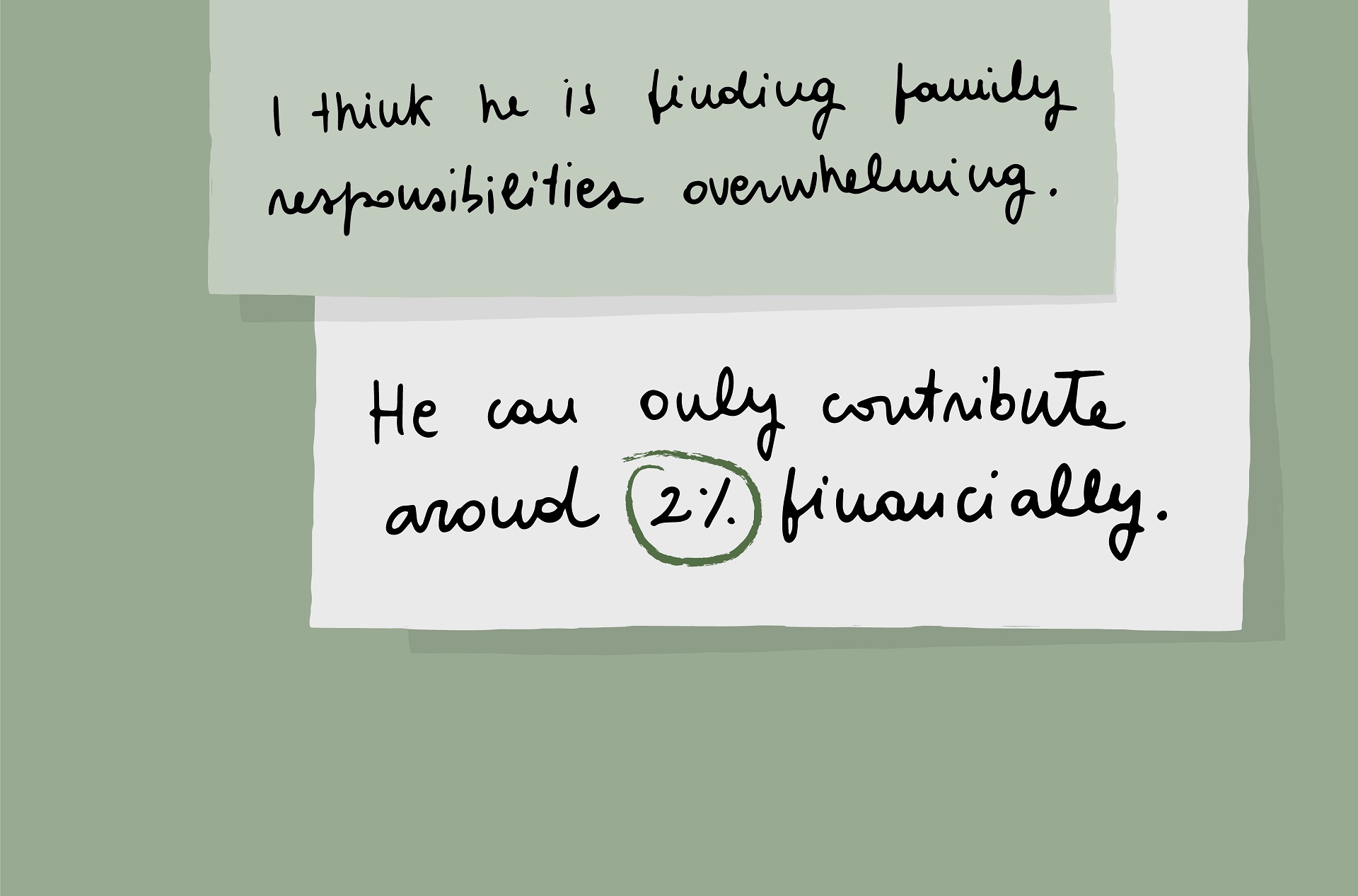
Daliya’s financial diary shows she wants to work, be independent and make enough money to live a decent life, but cannot get enough childcare support from her partner and doesn’t know how to obtain financial advice to help her determine whether she should work or stay home.
Despite wanting to work, Daliya was unable to find a job in 2019. Additionally, her Disability Living Allowance ended in April 2019. This caused great financial strain on her as she provided the main source of income for her family.
In July 2019, Daliya relied on her savings, which quickly ran out and weren’t enough to cover her expenses for the coming months. So she took three loans – one per month from July through to September.
With no income at all, taking out loans was the only way in which her family could survive this particular cliff-edge moment of being unemployed and losing benefits. Daliya was budgeting and making financial decisions to the hour. Eventually, following an appeal, Daliya started receiving Personal Independence Payments (PIP) in October 2019.
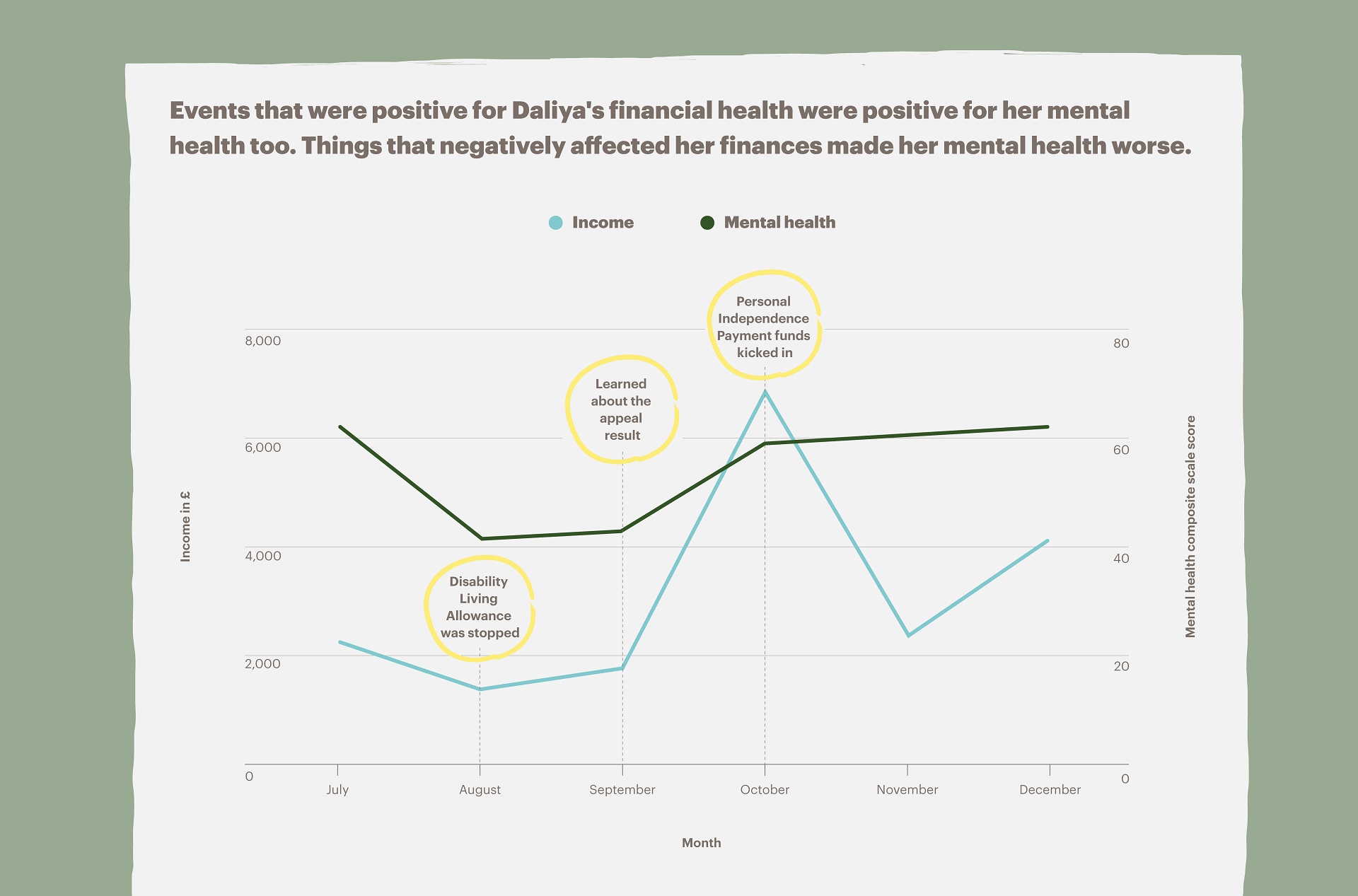
These graphs show Daliya’s income and levels of mental health, as measured by the Mental Health Composite Scale (short form).
Daliya’s mental health declined after her Disability Living Allowance ended in April 2019. In October, when Daliya’s appeal was successful and she began receiving Personal Independence Payments, she reported that her mental health was better. This shows that events that were positive for her financial health were also positive for her mental health.
Daliya’s health and financial conditions fluctuated from month to month and it became increasingly complicated to coordinate the different appointments and treatments for each of her health conditions. She felt it was hard enough to keep up with her medical conditions, how was she also to stay on top of her finances?
Financial strain caused Daliya to become moody, clumsy and lose sleep, and it greatly affected her mental health, which was already poor. Even though she had access to short-term loans, she lacked a longer-term financial support system.
Daliya would have greatly benefited from accessing financial and legal providers who created trusting, long-term relationships with her from the point when she began looking for work.
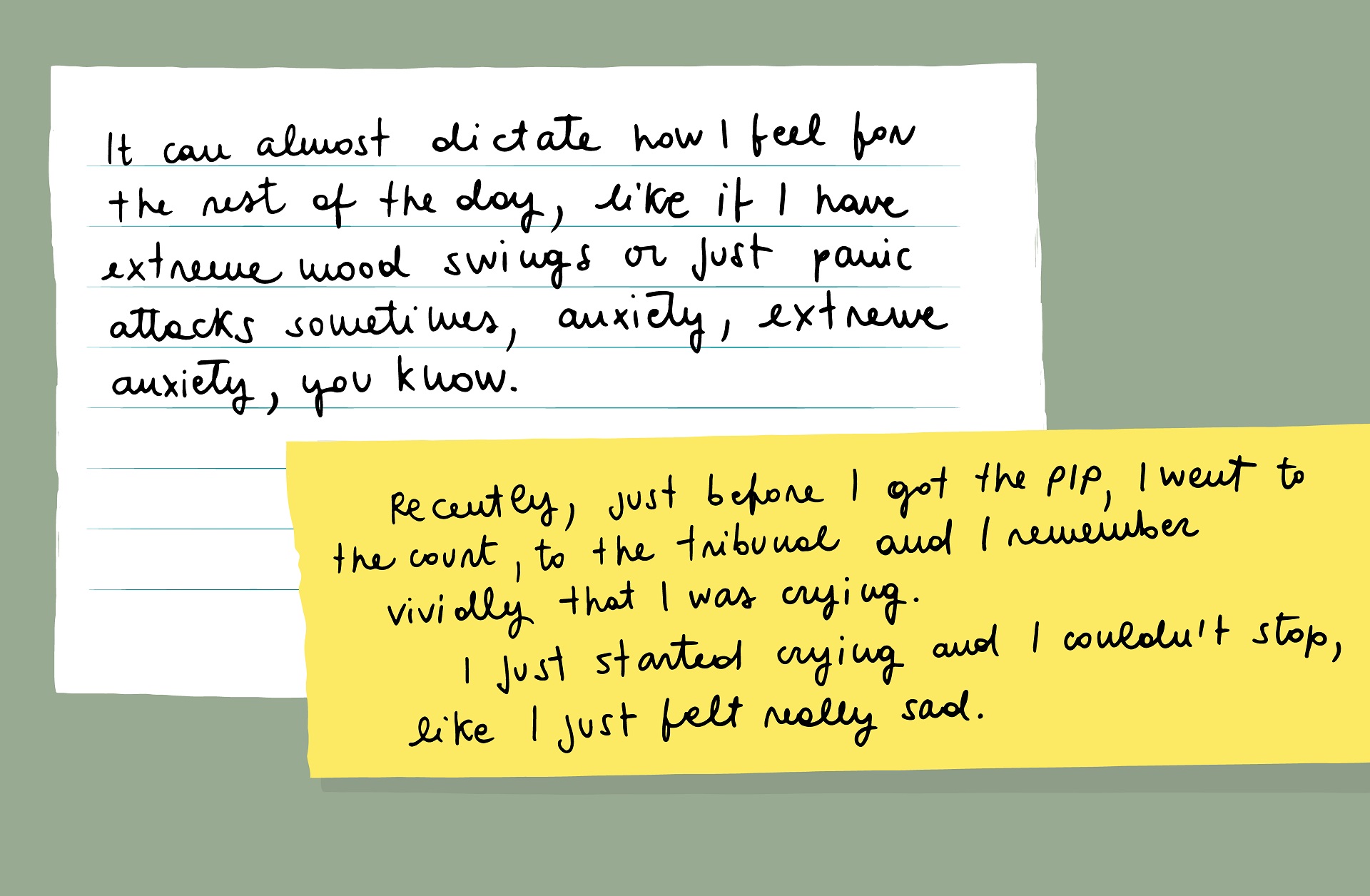
Daliya said in her financial diary that it was easier to make more careful decisions when she was feeling better. She also noted that her eye condition led her to make financial mistakes by accident.
Once, she added an extra an extra 0 to the end of a financial transfer, writing £2000 instead of £200, because she couldn’t see properly but was unable to afford glasses. It’s likely that Daliya may not have known that she would be eligible for free eyecare.
On average, Daliya makes around 12 financial decisions every month, or two to three decisions per week, such as taking out or paying back a loan or paying for insurance. Financial decisions are particularly complex and stressful because they deal with relatively large amounts of money, can have serious future implications, and are not easily reversed.
For Daliya, these decisions are even harder to make because urgency, poor mental health, and lack of financial control all combine to increase her stress levels and anxiety. This limited ‘cognitive bandwidth’ makes accessing and using services especially hard for people living with long-term conditions on low incomes.
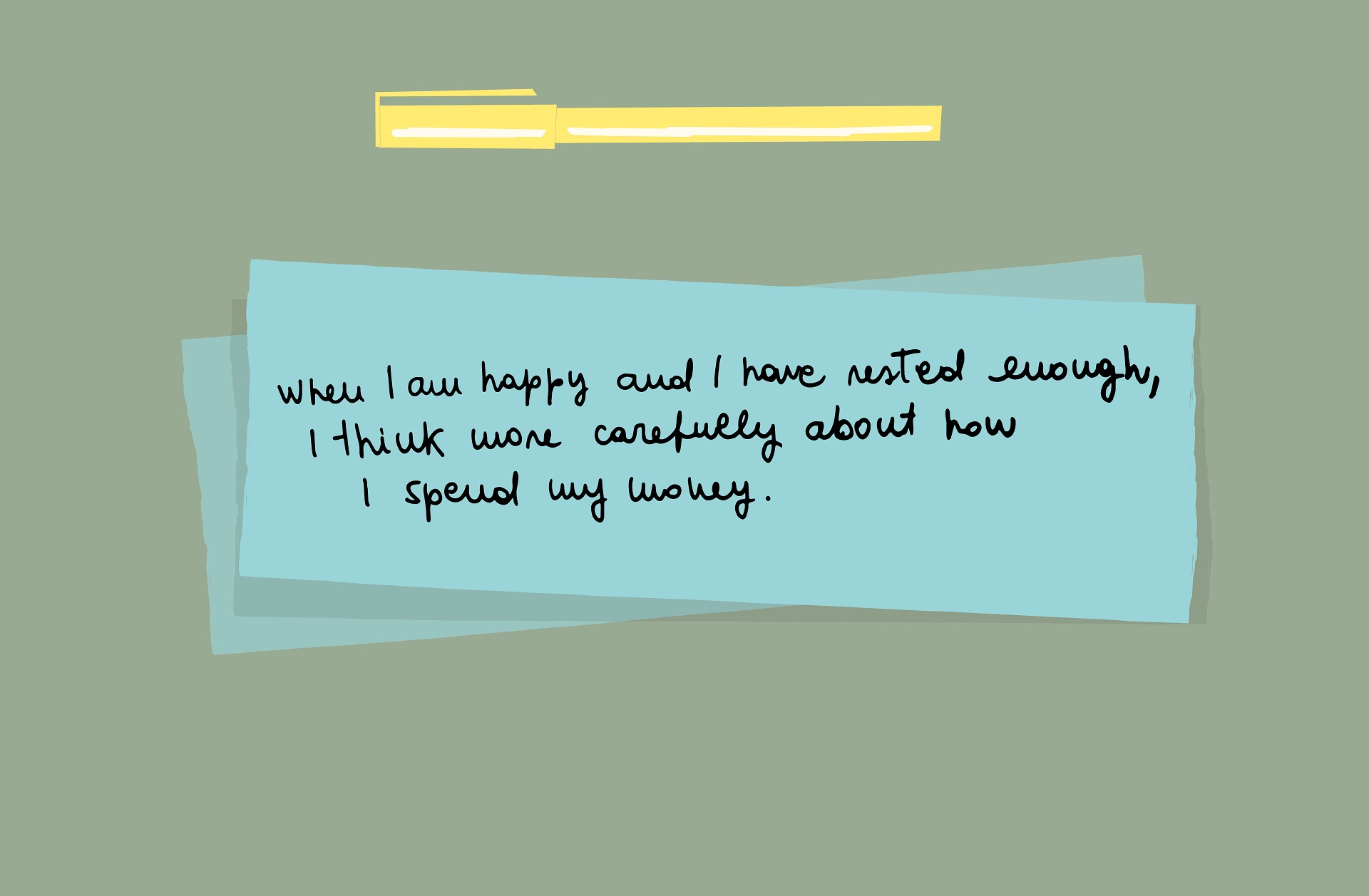
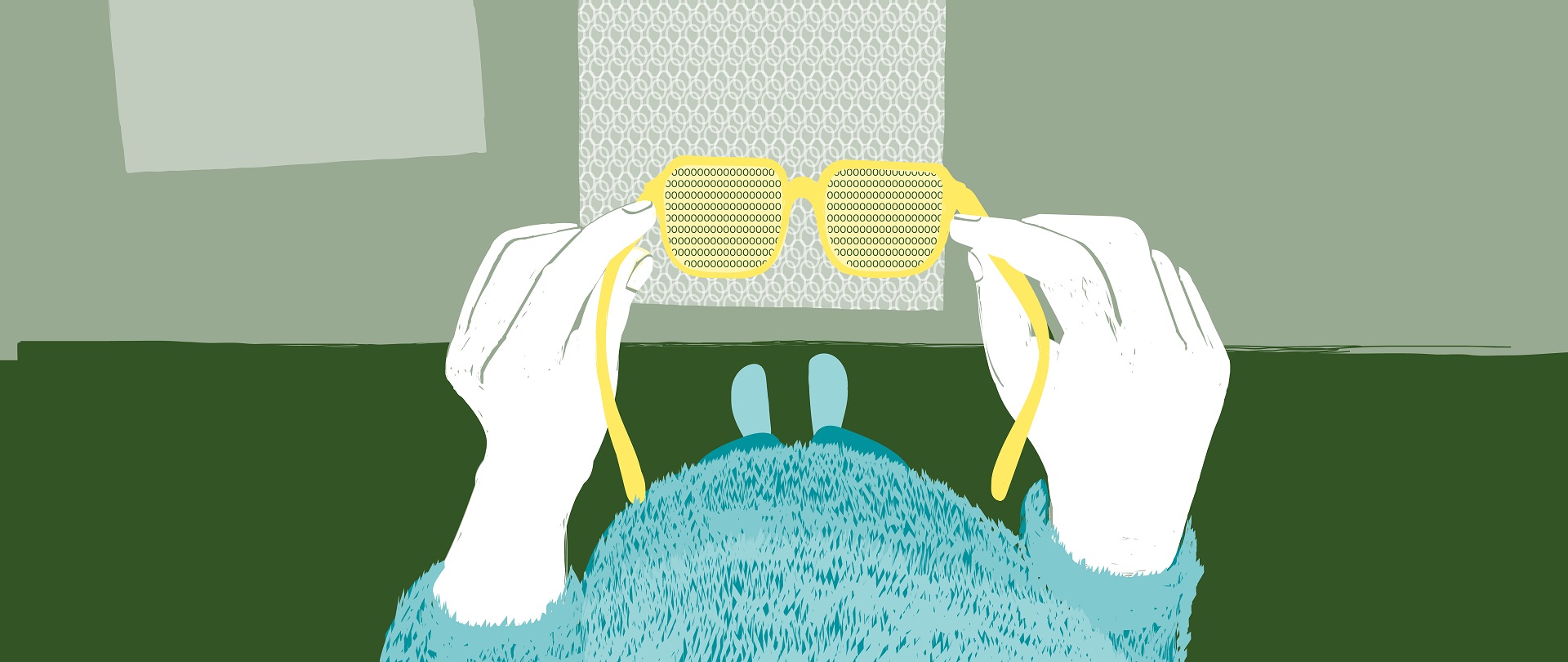
When asked what she thought would help her mental and financial health, Daliya said “counselling.” While Daliya clearly desired sound financial health and financial counselling, others detailled in their financial diaries that sadly, the organisations they sought support from were not listening to them, so they gave up reaching out.
If she had been offered proper debt and money advice, Daliya would have been able to navigate her options better and known what benefits she was entitled to, such as eyeglasses and other necessities.
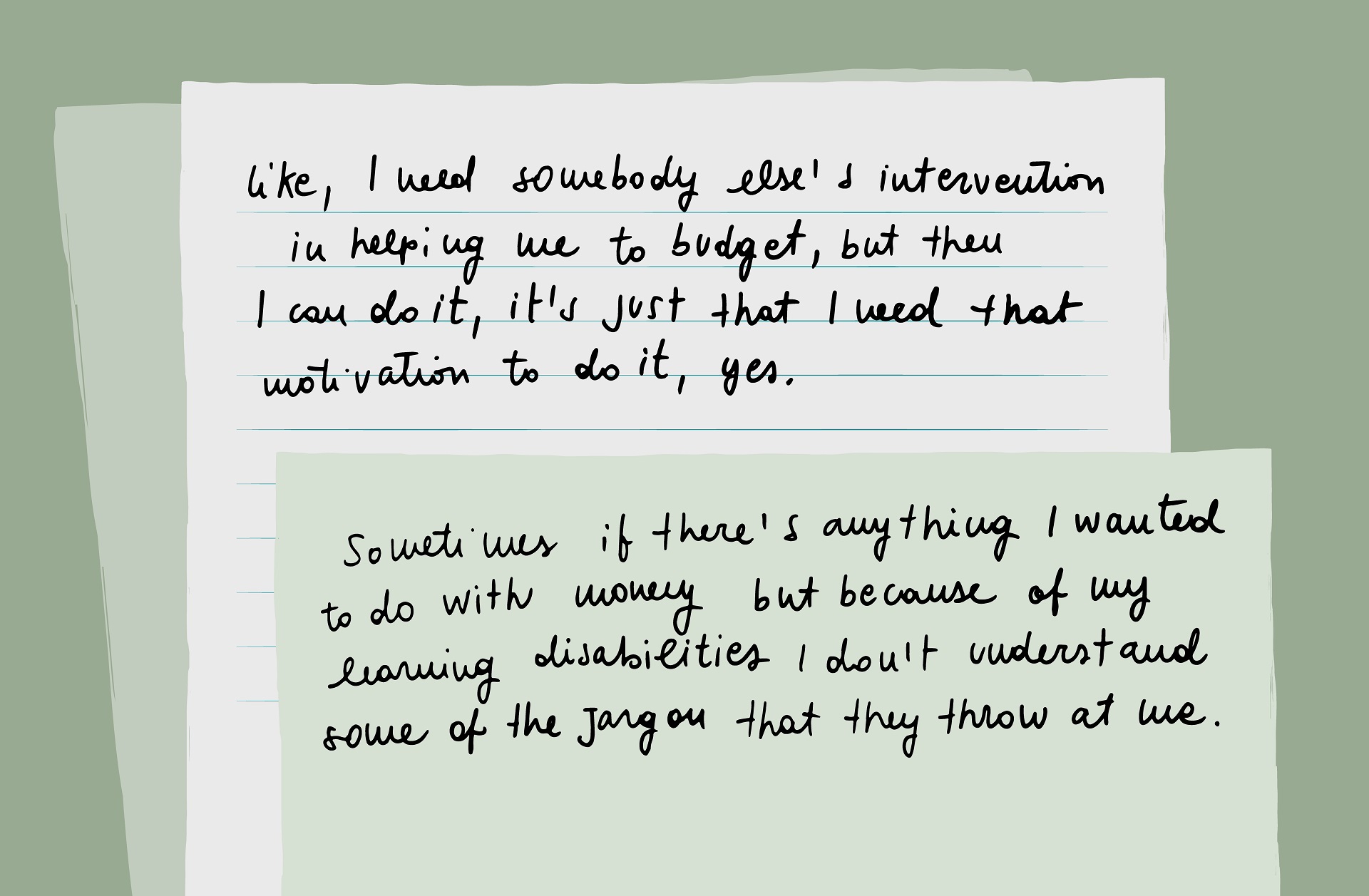
Daliya’s experience shows us practical opportunities for different organisations to improve the health and financial health of people like her. These are:
Two practical ways to do this are:
Financial foundations for adult health
Andrea is a 44-year-old and originally from Latin America. Her housing conditions were extremely bad, and they made her feel sick. Though the damp in her house made her asthma worse, better housing was unaffordable to her.
Financial foundations for adult health
Luisa is a 28-year-old mother of two young children, aged one and four. She lives with depression and anxiety. When Luisa's finances caused her depression to worsen, this manifested itself through physical symptoms.
Financial foundations for adult health
Shannon is a 55-year-old single mother with four teenagers. Her precarious working conditions negatively impacted her health, especially when she couldn’t take paid time off work when she needed it.